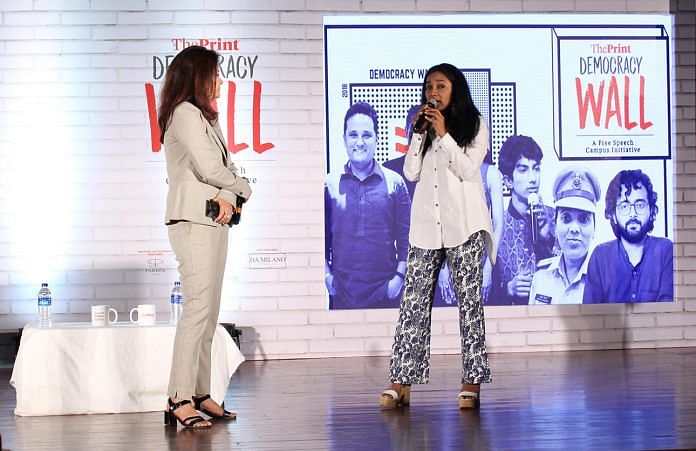Chatterjee says censorship is one of the biggest issues the Indian film industry faces, stresses the need to question powerful institutions.
Actor Tannishtha Chatterjee has said that film stars in the country should be politically active.
Speaking at ThePrint’s Democracy Wall at Somaiya College in Mumbai Monday, she said that actors tend to keep mum so as to not alienate a social group.
A heavily censored industry
Known for her roles in bold films like Parched and Angry Indian Goddesses, Chatterjee says that censorship is one of the biggest issues the industry faces. According to her, censorship of film happens at various levels, beginning with the people who are financing the content — who ultimately decides how and how much to fund the project. The second level of censorship comes from the censor board.
Creators also tend to “self-censor”, and worry about whether certain content will antagonise the audience and hinder their film’s chances of doing well at the box office. Finally, using the example of Padmaavat, Chatterjee explained that the industry also has to deal with another level of censorship that comes from fringe groups, which take offence and dictate the content.
“We as a country are still at a nascent stage of democracy in terms of freedom of expression when it comes to creativity,” she said. “We get offended very soon.”
Chatterjee said that in India, jokes and humour tend to “punch down” instead of “punch up”. It’s acceptable to make sexist jokes or make fun of people with disabilities, she said, but when it comes to making fun of or commenting on powerful institutions like religion and political ideology, there’s always censorship.
“It should be the reverse,” Chatterjee said. “Because power is needed to be checked through questioning.”
Drawing inspiration for her films
In response to a student’s question about her role in the film Parched, Chatterjee talked about and encounter she had with a woman in Gujarat that greatly influenced both the role she played and the film. Her character in the film is Radha, a young widow struggling with her sexuality. Chatterjee said that she had encountered a real-life Radha, who was widowed at the age of 17 with two children. When Chatterjee met her, she confided her sexual frustration to her, and revealed that she’d been having phone sex with a younger man for some time now.
Chatterjee used this incident to draw inspiration for her role, and also explained how her encounter with this woman taught her how the stigma attached to sexuality and women expressing themselves through sex is patriarchal.
While the outside world does influence her on-screen portrayals, Chatterjee said that she was drawn to acting because it is almost spiritual, as she explores characters through herself.
“I always wanted to explore myself through acting,” she said. “Not because I wanted the attention, because I’m obsessed with the art form.”
Being a woman in the film industry
The only way to bridge the wage gap in the industry is by having more and more women in leading roles, said Chatterjee. “The kind of stories that are being told have become more and more patriarchal. We need to break that, and have female superstars, and only when that happens will the pay be equalised,” she said, citing Madhuri Dixit and Sridevi as the two last female superstars who could exclusively draw an audience. This generation of female actors lack that quality, she said.
However, the only way to break this pattern is by putting an end to damaging stereotypes, she said. Influencers play an important role in pop culture, and Chatterjee says the onus is on them to change the discourse.
Speaking about her own struggles in the industry, she said that she was asked to bleach and lighten her skin and undergo cosmetic surgery to look more like a conventional Bollywood star. She admitted that she was tempted to, but chose not to give in to the pressure — and this is why she got to work on more interesting projects and take on more challenging roles, because she didn’t conform to the stereotype.



